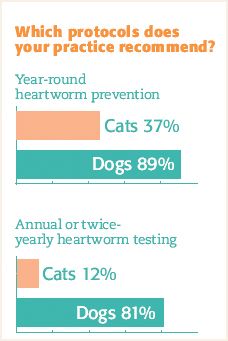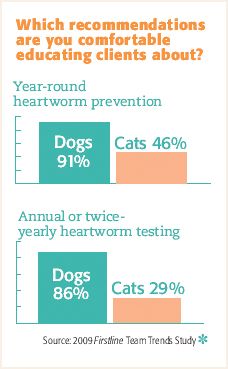Feline heartworms: The cat's got your tongue
Team members don't know what to say to educate clients about feline heartworms.
Most team members—and most clients—recognize heartworms endanger dogs. You might not realize cats are just as threatened—but differently. The distinction: Adult worms aren't the main feline problem. "Cats get pulmonary disease because most of the larvae die before adulthood," says Dr. Jane Brunt, owner of two feline-only clinics in Maryland and executive director of the CATalyst Council. "And that mostly occurs in the lungs." The result is heartworm-associated respiratory disease (HARD).
HARD is a relatively new diagnosis, so campaigns like KNOW Heartworms, for which Dr. Brunt is a spokesperson, are spreading the word. An increasing number of practices are recommending that cats follow a prevention program, but there's still room for improvement, as the data below illustrate. Veterinary team members need to know the facts to effectively educate pet owners. Learn the following points to help clients take their feline friends' needs to heart.
1. Worm life cycle matters
Mosquitoes carry heartworm larvae. When a mosquito bites a cat, larvae enter its system through the wound. As the larvae mature, they're carried to the cat's heart and lungs via the cardiopulmonary blood flow. At this stage, many larvae die, causing lung lesions and HARD.
2. Location isn't important
The occurrence of feline heartworm disease is markedly lower in some sections of the country, but cases have been reported in all 50 states. "At our clinic, about 1 percent of cats tested are positive," says Ann Bradley, CVT, CVPM, practice manager at Cat Care Clinic in Madison, Wisc. "But if it's your cat, that percent no longer matters. That's what we tell clients who don't think prevention is important."
Indoor cats need prevention too. In fact, 28 percent of cats diagnosed with heartworms are inside-only pets, according to a North Carolina State University study. Indoor cats are at lower risk than outdoor pets, but mosquitoes sneak inside through open doors and windows. And one bite from an infected mosquito can do the damage.

3. Heartworms can't hide
Microscopic heartworms show themselves through tell-tale signs. Because feline heartworms affect the lungs more than the heart, cats with asthma-like symptoms may actually be suffering from heartworm infection. Specific signs to watch for include coughing, panting, open-mouthed or rapid breathing, fainting, gagging, lethargy, and appetite and weight loss.
